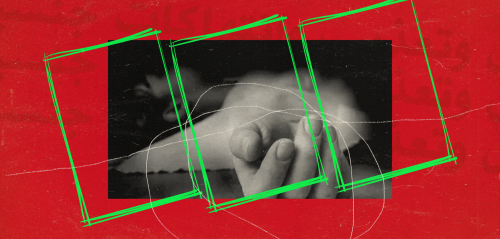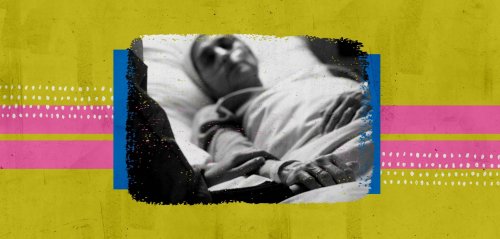"What I don't really understand is, when did my brothers accumulate all this cruelty and injustice? Just yesterday we shared one belly, and we had gathered and held one another in one picture frame. I don't know at what point in time their feelings began to change. I am Roaa, a young Alawite woman who people say I'm beautiful. I am a lawyer married to a doctor, I learned with conclusive evidence that my husband is cheating on me with dozens of other women, and he also knows with full certainty that I am too weak to react, therefore, he continues to cheat on me, and I continue to keep silent about his betrayal, and the reason for this is that the male members of my family agreed a long time ago that there is no inheritance for girls, since daughters bring strangers and take care of land for the family, but they and their children are not part of the family."
"I am Roaa, nicknamed the mother of girls, as an insult that my husband's family shames me with, because I did not birth him any male children. I am looking for any emotional and even material support that would help me in my decision to separate from my husband. However, everyone I have told in my family of my intention stood against me, and said that I am difficult to deal with and that I am not the only one whose husband is cheating on her, and that this is not the first time. Only my sister, who lives across the ocean, gave me a promise and support, and told me: 'Make your decision and I am with you. This is my house in Damascus, and this is its key'."
Until recently, I used to listen to stories told about what the passage of time does to siblings, and how they become strangers, but I didn't expect us to become the story
The promise changed the reality of Roaa (pseudonym), who is from the village of al-Sawda in Tartous. For the first time, she will get to have a chance, as she tells us, the chance to live her life and do something because she wants to, not because she has no options. She remembers the stance that her brothers took, and how they divided the inheritance between them without telling the sisters. She recalls the number of times she wished she could spend Eid with her mother, and how her mother would avoid saying "welcome", or "we're waiting for you", for fear that her brothers may be upset with her presence, as she is the stranger among them and the way they treat her.
On the other hand, Roaa, 42, says, "When my mother underwent surgery, my brothers were surprised how my sisters and I did not rush to serve her, as, in their perspective, we are the first who must take care of her, because it is simply our duty. But when it comes to our right to inheritance, it is considered shameful for us to ask for it."
Almonds and ekedinia fruits
"As soon as a brother gets married and has children, what I call the hunger of the sect appears," says Hanadi, 38, adding, "Until recently, I used to listen to stories told about what time does to siblings, and how they become strangers, but I didn't expect us to become the story, and what a story it is! The story whose main protagonists are a single almond and an ekedinia fruit."
"Who would believe that we quarrel every year over an almond or an akednia?" Hanadi asks, and then answers, "At first I thought that we were the only ones living these details that I was ashamed to talk about, before I discovered that it is a common story and is widespread in the villages of the coast, my sister called me yesterday, laughing, and asked me to read the story of 'the Almond'."
The story, which was published by a local paper, tells that a woman went to the vegetable store to buy an ounce of green almonds. The vendor asked her, "You've come to buy almonds while your brother is selling them by the crate? Aren't these the almonds you're going to buy from your brother?" The woman choked up, because she had helped her father plant and grow these almonds when her brother would sleep until noon, and she and her sisters removed the stones and cleared the land so that it would become suitable for farming, and when her father transferred ownership of the land, he distributed it among the boys and deprived the girls of any part of it.
"I laughed at the end of the story, too, because it is very similar to our story, the story of the ekedinia fruit", Hanadi continues, adding, "Since I was a child, I would see my father taking care of the land around our house. I do not remember that any of my brothers had one day approached and helped him, as we girls were the ones who used to do this. Since my father distributed the ownership of the land among my brothers, my brother started planting fruit trees. I felt happy, as we will not want anymore, I said to myself. At that time, my mind took me back to an old memory from my childhood when I used to pass by a land full of almond trees on my way back from school, and I'd look at it with longing, and wish I could steal a handful of its fruits."
I am Roaa, nicknamed 'the mother of girls', an insult that my husband's family shames me with, since I didn't birth him any male children. I'm looking for any emotional or even material support that would help me in my decision to separate from my husband
Hanadi (pseudonym) tells her story as a woman from the village of al-Hisan in the countryside of Jableh, "Yesterday went and today came, and we grew up and the almonds grew and we also had ekedinia, pomegranate and basil, but ever since the trees began to bear fruit, we never stopped arguing every time we visit my father and mother. My brother gets angry whenever my sister's children approach the ekedinia tree and pick a piece of fruit from it. He finds no shame in asking my mother about who was it that committed this great crime, and my mother would stay silent and not answer. In the end, my brother fenced off the ekedinia tree with a strip of metal mesh so that no one would come near it, and I later found out that he intends to sell it."
The right of girls and the violence of men
Girls' defense of their rights is no less harsh and violent than that of fathers and sons, where violence only breeds violence, and injustice only breeds hatred and revenge. Somaya cut off her parents three years ago, as a reaction to being deprived of her inheritance, as she said. In the last meeting between them, Somaya, 35, who hails from the village of Batmana in the countryside of Jableh, swore that she screamed at the top of her voice in the face of her father, something she never expected she would ever do in her entire life, but the difficult circumstances and need brought out all the pain inside her. Like a mashine gun, she asked all her questions one after the other, and did not stop until she had emptied her armory.
"I couldn't understand the idea of being deprived of my inheritance, just because I'm a girl. The images crowded in my head, and I remembered my worry for my father when he became bedridden due to an illness he suffered, how I used to sit him during the day, and count his breaths at night when he slept, and how I used to hug him and cry, crying because I was afraid of losing him. I love my father, I love him very much, and I'm overwhelmed with happiness whenever he runs his hands on my head and prays for me to succeed. I feel good and happy when I take care of him and trim his nails."
She adds, "Although he deprived me of inheritance, I cannot be anything but full of affection, love, respect and prayers for longevity and a good hereafter, and I pray from my heart that my brothers will be grateful for the inheritance that my father worked hard to provide for them, and to remain loyal to my father and mother until the end of their lives. We have not died yet, but we have seen who died, and it is not far from my father's family. My uncle died, broken and alone, and after his death, his wife also remained alone. The whole village knows how much my aunt worked hard during her life and how much she sacrificed for her children. She ran around so much, but none of her sons or their wives took care of her physical needs, her hygiene, bathing, or even washing her clothes, and she was unable to do it alone."
Inheritance is one of the matters included in the Personal Status Law, and the text in it regarding the inheritance of women is clear
Somaya recounts, "In the last meeting I saw her when she came to visit us, shortly before she died, she was very sad and depressed. She cried a lot when she told us that none of her sons came to ease her loneliness or visit her, even though only a few meters separate their homes from hers. She, too, died broken and alone. I am very pained and saddened by all this. I miss my father and mother. I miss them so much, but my sect no longer means anything to me, and I don't care about getting to know it, because it mostly says it's corrupt, and its corruption is reflected in the behaviors of its sons towards its daughters."
The text of the law is clear
Lawyer and activist Safiyya Fadel, speaking to Raseef22, points out an important point, which is that the name "Alawite sect" is an incorrect and rejected term, because there is no such thing as an Alawite sect in the law and in the divisions of the Syrian state.
As for inheritance, she explains that "the identity of the state in Syria and its religion are the Islamic religion, which relies on the Holy Qur'an and Islamic schools of thought, especially the Hanafi school as its primary source, and thus Personal Status Law was formulated, which applies to all those who practice the Islamic religion except the Druze sect, and inheritance is one of the matters included in the Personal Status Law. The text in it regarding the inheritance of women is clear, knowing that there is an entire section in the Holy Qur'an dedicated to inheritance, which is Surah An-Nisa, and it is used as a basis for the distribution of inheritance".
When she went to buy almonds, the vendor said, "You're buying almonds when your brother sells them by the crate?" She choked up, as she had helped her father plant and grow them while her brother would sleep in, but then her father gave it all to the sons
Lawyer Fadel adds, "There are two types of inheritance in Syria; Sharia inheritance, which is what was mentioned earlier, and a legal inheritance, which was developed at the time of the Ottoman Empire. One of the Abbasid caliphs had only daughters, and according to Islamic law, half of his property will go to his brothers and their sons. This prompted him to gather scholars to find a solution for him that would save the king, and so the law on the transfer of imperial funds was developed, according to which the male and female are equal in inheritance and do not require the presence of a male relative. This law applies to imperial lands based on the principle of; what belongs to the emir belongs to the emir, while imperial lands are lands located outside the administrative boundaries of towns and cities."
A custom, not religious doctrine
All the scholars we surveyed, including religious figures, sheikhs and clerics in the villages of the coast, confirmed that depriving women of inheritance is a custom and not a fundamental aspect of Alawite doctrine. This custom arose because the majority of the Alawite minority lived in an agricultural society where land had value. It was feared that if a daughter were given her share of the inheritance, the land would pass through marriage to another family, and consequently there was a fear of dispersing agricultural property.
I am a young Alawite woman and a lawyer. People say I'm beautiful, but I know my husband is cheating on me with dozens of women, and he knows I must remain silent, because the male members of my family agreed long ago that there is no inheritance for girls
Over time, this habit has turned into a custom and tradition, without asserting that the majority of members of the Alawite minority apply this practice, as there are many who pass down their inheritance to their daughters, and this varies from one village to another, as well as between villages and urban centers. It is also variable based on the environment, the economic situation, as well as the intellectual development and its impact on the development of society's view of women.
What is certain is that this custom is more entrenched in rural areas and villages, where the heads of families, if they want to deprive females of their inheritance, resort to transferring their property to male heirs during their lifetime through a formal sale contract. Using this method, the rights of daughters are lost, and so upon the death of the father, there are no heirs to divide the inheritance among.
Raseef22 is a not for profit entity. Our focus is on quality journalism. Every contribution to the NasRaseef membership goes directly towards journalism production. We stand independent, not accepting corporate sponsorships, sponsored content or political funding.
Support our mission to keep Raseef22 available to all readers by clicking here!
Interested in writing with us? Check our pitch process here!









